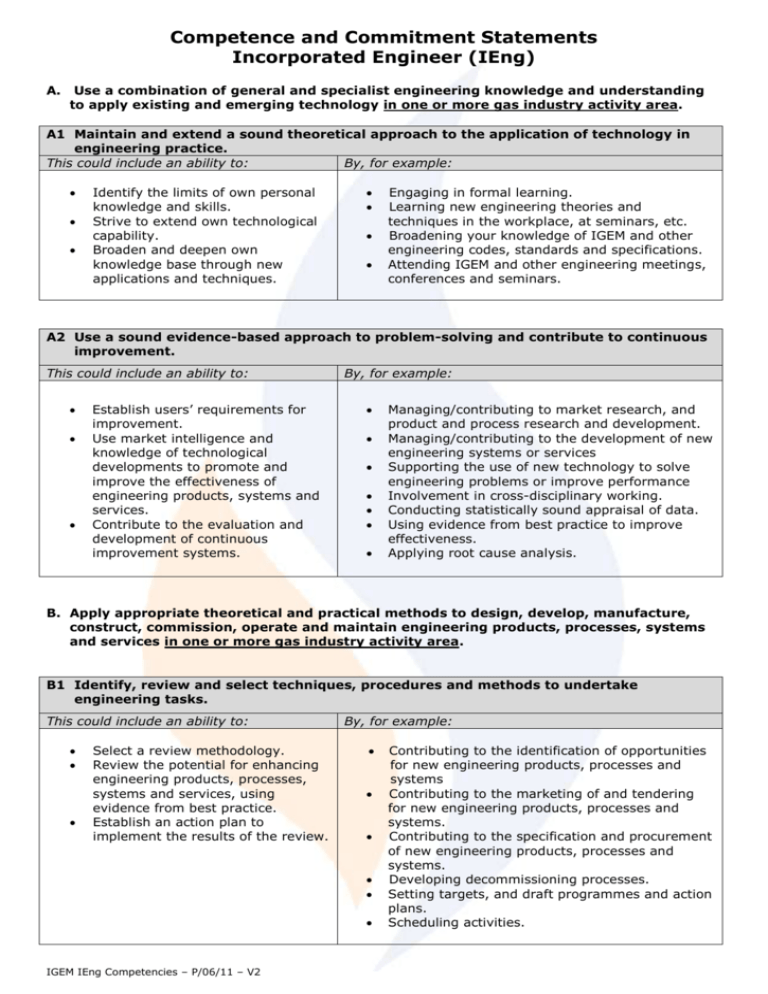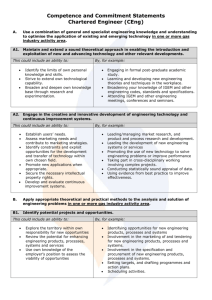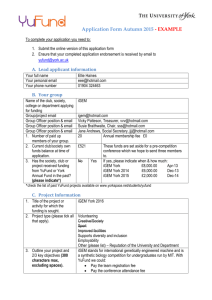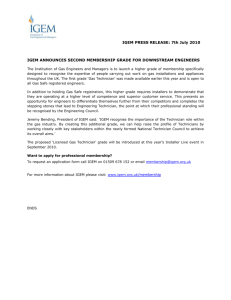IEng Competence and Commitment Statements
advertisement

Competence and Commitment Statements Incorporated Engineer (IEng) A. Use a combination of general and specialist engineering knowledge and understanding to apply existing and emerging technology in one or more gas industry activity area. A1 Maintain and extend a sound theoretical approach to the application of technology in engineering practice. This could include an ability to: By, for example: Identify the limits of own personal knowledge and skills. Strive to extend own technological capability. Broaden and deepen own knowledge base through new applications and techniques. Engaging in formal learning. Learning new engineering theories and techniques in the workplace, at seminars, etc. Broadening your knowledge of IGEM and other engineering codes, standards and specifications. Attending IGEM and other engineering meetings, conferences and seminars. A2 Use a sound evidence-based approach to problem-solving and contribute to continuous improvement. This could include an ability to: Establish users’ requirements for improvement. Use market intelligence and knowledge of technological developments to promote and improve the effectiveness of engineering products, systems and services. Contribute to the evaluation and development of continuous improvement systems. By, for example: Managing/contributing to market research, and product and process research and development. Managing/contributing to the development of new engineering systems or services Supporting the use of new technology to solve engineering problems or improve performance Involvement in cross-disciplinary working. Conducting statistically sound appraisal of data. Using evidence from best practice to improve effectiveness. Applying root cause analysis. B. Apply appropriate theoretical and practical methods to design, develop, manufacture, construct, commission, operate and maintain engineering products, processes, systems and services in one or more gas industry activity area. B1 Identify, review and select techniques, procedures and methods to undertake engineering tasks. This could include an ability to: Select a review methodology. Review the potential for enhancing engineering products, processes, systems and services, using evidence from best practice. Establish an action plan to implement the results of the review. By, for example: IGEM IEng Competencies – P/06/11 – V2 Contributing to the identification of opportunities for new engineering products, processes and systems Contributing to the marketing of and tendering for new engineering products, processes and systems. Contributing to the specification and procurement of new engineering products, processes and systems. Developing decommissioning processes. Setting targets, and draft programmes and action plans. Scheduling activities. B2 Contribute to the design and development of engineering solutions. This could include an ability to: Contribute to the identification and specification of design and development requirements for engineering products, processes, systems and services Identify problems and evaluate possible engineering solutions to meet client needs Contribute to the design of engineering solutions By, for example: Contributing to theoretical and applied research. Managing/contributing to value engineering and whole life costing. Working in design teams. Drafting specifications. Developing and testing options. Identifying resources and costs of options. Producing detailed designs. B3 Implement design solutions and contribute to their evaluation. This could include an ability to: Secure the resources required for implementation Implement design solutions, taking account of cost, quality, safety, reliability, appearance, fitness for purpose and environmental impact Identify problems during implementation and take corrective action Contribute to the evaluation of design solutions Contribute to recommendations for improvement and actively learn from feedback on results By, for example: Following the design process through into production/operation. Operating and maintaining processes, systems etc. Contributing to reports on the evaluation of the effectiveness of the designs. Contributing to engineering product, process, service or system improvement. Interpreting and analysing the performance of engineering products, processes, services or systems. Contributing to determining critical success factors. C. Provide technical and commercial management in one or more gas industry activity area. C1 Plan for effective project implementation. This could include an ability to: Identify the factors affecting the project implementation Prepare and agree implementation plans and method statements Secure the necessary resources and confirm roles in project team Apply the necessary contractual arrangements with other stakeholders (client, subcontractors, suppliers, etc.) IGEM IEng Competencies - P/06/11 – V2 By, for example: Contributing to project scopes or specifications Managing/contributing to project planning activities. Producing and implementing procurement plans. Contributing to project risk assessments. Collaborating with key stakeholders. Planning programmes and delivery of tasks. Identifying resources and costs. Preparing and agree contracts/work orders. Page 2 of 7 C2 Manage the planning, budgeting and organisation of tasks, people and resources. This could include an ability to: Operate appropriate management systems Work to the agreed quality standards, programme and budget Manage work teams, coordinating project activities Identify variations from quality standards, programme and budgets, and take corrective action Evaluate performance and recommend improvements By, for example: Managing/contributing to project operations. Managing the balance between quality, cost and time. Managing contingency processes. Contributing to the management of project funding, payments and recovery. Satisfying legal and statutory obligations. Managing tasks within identified financial, commercial and regulatory constraints. C3 Manage teams and develop staff to meet changing technical and managerial needs. This could include an ability to: Agree objectives and work plans with teams and individuals Identify team and individual needs, and plan for their development Manage and support team and individual development Assess team and individual performance, and provide feedback By, for example: Setting context, assigning tasks and reviewing performance of team members Carrying out/contributing to staff appraisals. Planning/contributing to the training and development of staff. Gather evidence from colleagues of the management, assessment and feedback that you have provided. Carry out/contribute to disciplinary procedures. C4 Manage continuous quality improvement. This could include an ability to: Ensure the application of quality management principles by team members and colleagues Manage operations to maintain quality standards Evaluate projects and make recommendations for improvement By, for example: Promoting quality. Managing/contributing to best practice methods of continuous improvement. Carrying out/contributing to quality audits. Monitoring, maintaining and improving delivery. Identifying, implementing and evaluating changes to meet quality objectives. D. Demonstrate effective interpersonal skills. D1 Communicate in English with others at all levels. This could include an ability to: Contribute to, chair and record meetings and discussions Prepare letters, documents and reports Exchange information and provide advice to technical and nontechnical colleagues IGEM IEng Competencies - P/06/11 – V2 By, for example: Planning, scheduling and chairing meetings Preparing reports, minutes of meetings, letters, programmes, drawings, specifications. Reviewing and providing feedback on the work of others Page 3 of 7 D2 Present and discuss proposals. This could include an ability to: By, for example: Prepare and deliver appropriate presentations Lead and sustain debates with audiences Feed the results back to improve the proposals Preparing and delivering presentations, records of discussions and their outcomes. Contributing to tender invitations responses and presenting engineering proposals D3 Demonstrate personal and social skills. This could include an ability to: E. By, for example: Know and manage own emotions, strengths and weaknesses Be aware of the needs and concerns of others Be confident and flexible in dealing with new and changing interpersonal situations Identify, agree and work towards collective goals Resolve conflicts and create, maintain and enhance productive working relationships Keeping records of meetings. Gathering evidence from colleagues of your personal and social skills. Compiling feedback from your performance or development reviews Contributing to productive working relationships. Applying diversity and anti-discrimination legislation. Demonstrate a personal commitment to professional standards, recognising obligations to society, the profession and the environment. E1 Comply with relevant codes of conduct. This could include an ability to: Comply with the IGEM code of conduct and those of any other relevant body. Work constructively within all relevant legislation and regulatory frameworks, including social and employment legislation. By, for example: Contributing to the affairs of IGEM. Working with a variety of conditions of contract Working within company codes of conduct . E2 Manage and apply safe systems of work. This could include an ability to: Identify and take responsibility for own obligations for health, safety and welfare issues. Manage systems that satisfy health safety and welfare requirements. Develop and implement appropriate hazard identification and risk management systems. Manage, evaluate and improve these systems IGEM IEng Competencies - P/06/11 – V2 By, for example: Undertaking formal health and safety training. Working with health and safety legislation, IGEM standards, company safety policies and best practice. Carrying out safety audits. Identifying and minimising hazards. Assessing and control risks. Delivering health and safety briefings and inductions. Page 4 of 7 E3 Undertake engineering activities in a way that contributes to sustainable development. This could include an ability to: Operate and act responsibly, taking account of the need to progress environmental, social and economic outcomes simultaneously. Use imagination, creativity and innovation to provide products and services which maintain and enhance the quality of the environment and community, and meet financial objectives Understand and encourage stakeholder involvement By, for example: Carrying out environmental risk and/or impact assessments. Managing best practice environmental management systems. Working within environmental legislation. Adopting sustainable practices. Contributing to positive social, economic and environmental outcomes. E4 Carry out continuing professional development necessary to maintain and enhance competence in own area of practice in accordance with IGEM guidelines. This could include an ability to: Undertake reviews of own development needs Prepare action plans to meet personal and organisational objectives Carry out planned (and unplanned) CPD activities Maintain evidence of competence development Evaluate CPD outcomes against the action plans Assist other with their own CPD IGEM IEng Competencies - P/06/11 – V2 By, for example: Keeping up to date with national and international engineering issues. Setting personal CPD objectives Maintaining CPD plans and records. Involvement in the affairs of IGEM. Evidence of your development through on-the-job learning, private study and IGEM, work based and external meetings, course and conferences. Page 5 of 7 IGEM Competence & Commitment Statements Evidence/Reference Form Incorporated Engineer (IEng) To be completed and submitted in addition to the Professional Review Report Candidate Name Date Comments / Reference to Evidence A B C 1. A . Maintain and extend a sound theoretical approach to the application of technology in engineering practice. 2. Use a sound evidence-based approach to problem-solving and contribute to continuous improvement. 1. Identify, review and select techniques, procedures and methods to undertake engineering tasks. 2. Contribute to the design and development of engineering solutions. 3. Implement design solutions and contribute to their evaluation. 1. Plan for effective project implementation. 2. Manage the planning, budgeting and organisation of tasks, people and resources. 3. Manage teams and develop staff to meet changing technical and managerial needs. 4. Manage continuous quality improvement. IGEM IEng Competencies - P/06/11 – V2 Page 6 of 7 D E 1. Communicate in English with others at all levels. 2. Present and discuss proposals. 3. Demonstrate personal and social skills. 1. Comply with relevant codes of conduct. 2. Manage and apply safe systems of work. 3. Undertake engineering activities in a way that contributes to sustainable development 4. Carry out continuing professional development necessary to maintain and enhance competence in own area of practice IGEM IEng Competencies - P/06/11 – V2 Page 7 of 7


